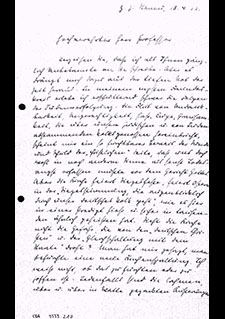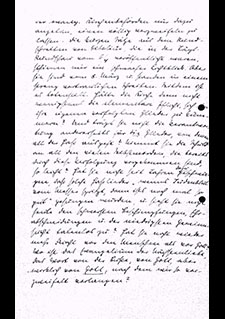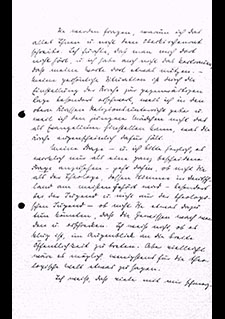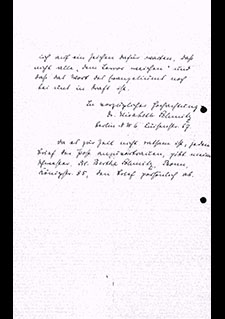Letters to Karl Barth
Full of compassion for the “non-Aryans” experiencing discrimination, whose suffering she witnessed close at hand, Elisabeth Schmitz attempted to move her church to signal its solidarity with the victims of ostracism and persecution starting in the spring of 1933.
She approached the influential theologian Karl Barth for the first time in April of 1933 in order to move him to issue a statement about the persecution of the Jews. While Barth shared her opinion about political developments, he did not want to endanger his job teaching theology with which he hoped to make a greater impact in the sense of of a church that understands itself better than with a public judgment that would presumably never be printed.
Schmitz did not let up, however. In January of 1934, she once again drew Barth’s attention to the desperate situation of Christians of Jewish ancestry in particular. In her letters, Schmitz found clear words for her church, which was permitting and partially supporting such a development. The Church and Christians in Germany had failed hopelessly in simple, plain, natural Christian love.
Barth was also of the opinion that the church had failed in this matter but indicated that the present Protestant church was however also precisely what ecclesiastical and theological liberalism had made out of it. He additionally asked her not to think too little of the potential effects of the Kirchenkampf.
A student of Harnack’s, Schmitz on the other hand defended liberal Protestantism and pointed out the nationalist, antisocialist and anti-Semitic tendencies within the Protestant church. She held the decisive criterion ultimately to be whether an individual is obedient to God foremost or to the state foremost.
She demanded from the Confessing Church that the members of the Pastors’ Emergency League look after their persecuted congregational members as an emergency program and protestant congregations cultivate contacts with Jewish congregations. Christian love had to be stressed very strongly in sermons and instruction. She herself attempted to do this in her religion class.
Elisabeth Schmitz visited Karl Barth in Switzerland every summer between 1936 and 1939. Her conversations with him on theological and ecclesio-political issues were bright rays of hope for her in these dark years (letter to Barth of June 4, 1946).
Source / title
- © Karl Barth-Archiv, Basel




